Same-Sex Marriage: A Sociological Exploration of Contemporary Debates
VerifiedAdded on 2022/12/29
|5
|1349
|40
Essay
AI Summary
This essay delves into the contemporary debate surrounding same-sex marriage, particularly in light of its legalization in Australia. It explores how same-sex marriage challenges traditional societal norms and expectations of marriage, which have historically been linked to procreation and gender roles. The essay examines the issue through a sociological lens, discussing the impact of changing cultural norms, the influence of feminist theories on the evolving definition of marriage, and the role of economic and social factors in modern unions. The paper also highlights how same-sex marriage aligns with the broader movement towards individual autonomy and the right to love and marry freely, regardless of gender or sexual orientation. It references relevant sociological literature and concludes by emphasizing the importance of societal acceptance and the willingness of individuals to define marriage on their own terms.
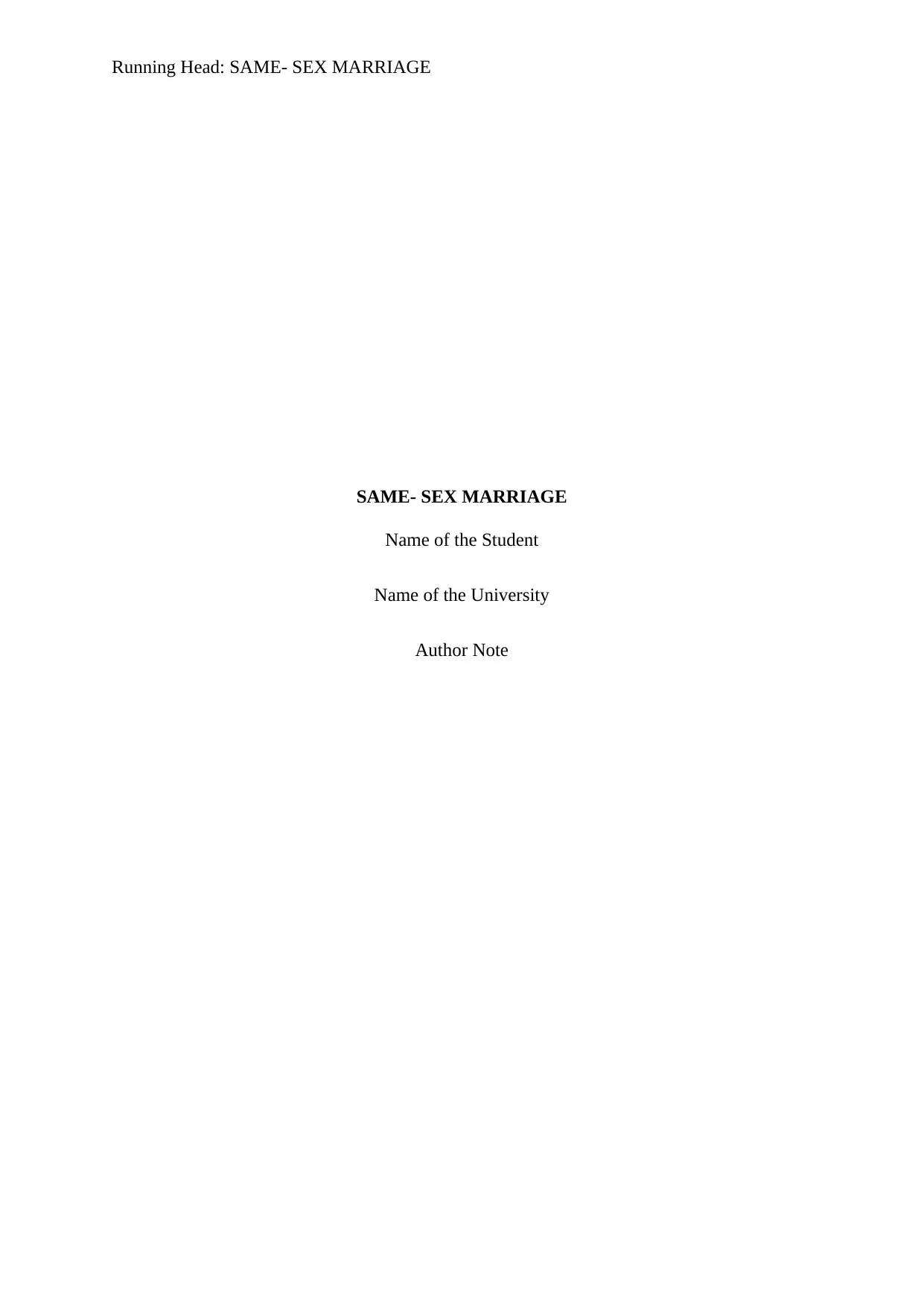
Running Head: SAME- SEX MARRIAGE
SAME- SEX MARRIAGE
Name of the Student
Name of the University
Author Note
SAME- SEX MARRIAGE
Name of the Student
Name of the University
Author Note
Paraphrase This Document
Need a fresh take? Get an instant paraphrase of this document with our AI Paraphraser
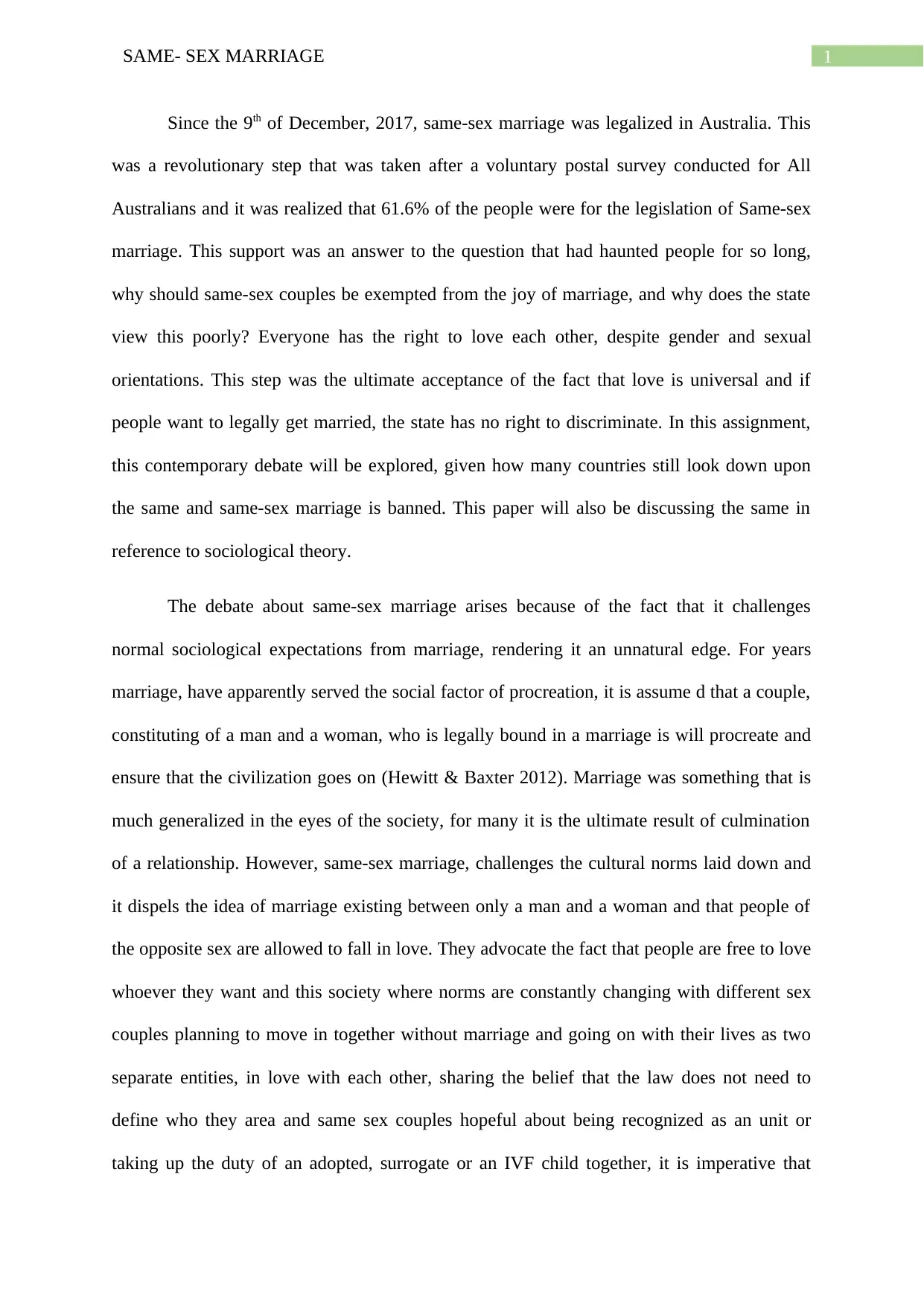
1SAME- SEX MARRIAGE
Since the 9th of December, 2017, same-sex marriage was legalized in Australia. This
was a revolutionary step that was taken after a voluntary postal survey conducted for All
Australians and it was realized that 61.6% of the people were for the legislation of Same-sex
marriage. This support was an answer to the question that had haunted people for so long,
why should same-sex couples be exempted from the joy of marriage, and why does the state
view this poorly? Everyone has the right to love each other, despite gender and sexual
orientations. This step was the ultimate acceptance of the fact that love is universal and if
people want to legally get married, the state has no right to discriminate. In this assignment,
this contemporary debate will be explored, given how many countries still look down upon
the same and same-sex marriage is banned. This paper will also be discussing the same in
reference to sociological theory.
The debate about same-sex marriage arises because of the fact that it challenges
normal sociological expectations from marriage, rendering it an unnatural edge. For years
marriage, have apparently served the social factor of procreation, it is assume d that a couple,
constituting of a man and a woman, who is legally bound in a marriage is will procreate and
ensure that the civilization goes on (Hewitt & Baxter 2012). Marriage was something that is
much generalized in the eyes of the society, for many it is the ultimate result of culmination
of a relationship. However, same-sex marriage, challenges the cultural norms laid down and
it dispels the idea of marriage existing between only a man and a woman and that people of
the opposite sex are allowed to fall in love. They advocate the fact that people are free to love
whoever they want and this society where norms are constantly changing with different sex
couples planning to move in together without marriage and going on with their lives as two
separate entities, in love with each other, sharing the belief that the law does not need to
define who they area and same sex couples hopeful about being recognized as an unit or
taking up the duty of an adopted, surrogate or an IVF child together, it is imperative that
Since the 9th of December, 2017, same-sex marriage was legalized in Australia. This
was a revolutionary step that was taken after a voluntary postal survey conducted for All
Australians and it was realized that 61.6% of the people were for the legislation of Same-sex
marriage. This support was an answer to the question that had haunted people for so long,
why should same-sex couples be exempted from the joy of marriage, and why does the state
view this poorly? Everyone has the right to love each other, despite gender and sexual
orientations. This step was the ultimate acceptance of the fact that love is universal and if
people want to legally get married, the state has no right to discriminate. In this assignment,
this contemporary debate will be explored, given how many countries still look down upon
the same and same-sex marriage is banned. This paper will also be discussing the same in
reference to sociological theory.
The debate about same-sex marriage arises because of the fact that it challenges
normal sociological expectations from marriage, rendering it an unnatural edge. For years
marriage, have apparently served the social factor of procreation, it is assume d that a couple,
constituting of a man and a woman, who is legally bound in a marriage is will procreate and
ensure that the civilization goes on (Hewitt & Baxter 2012). Marriage was something that is
much generalized in the eyes of the society, for many it is the ultimate result of culmination
of a relationship. However, same-sex marriage, challenges the cultural norms laid down and
it dispels the idea of marriage existing between only a man and a woman and that people of
the opposite sex are allowed to fall in love. They advocate the fact that people are free to love
whoever they want and this society where norms are constantly changing with different sex
couples planning to move in together without marriage and going on with their lives as two
separate entities, in love with each other, sharing the belief that the law does not need to
define who they area and same sex couples hopeful about being recognized as an unit or
taking up the duty of an adopted, surrogate or an IVF child together, it is imperative that
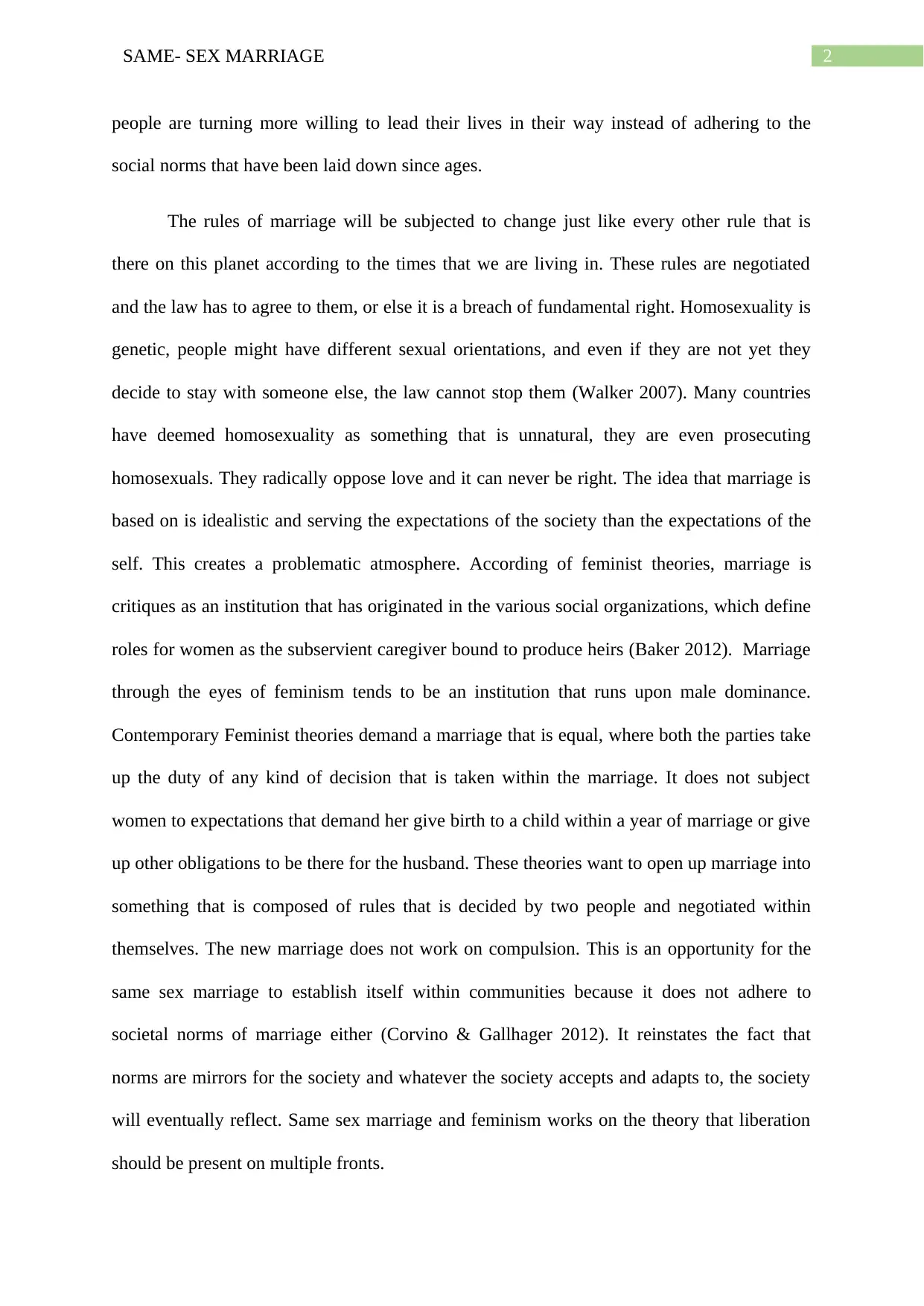
2SAME- SEX MARRIAGE
people are turning more willing to lead their lives in their way instead of adhering to the
social norms that have been laid down since ages.
The rules of marriage will be subjected to change just like every other rule that is
there on this planet according to the times that we are living in. These rules are negotiated
and the law has to agree to them, or else it is a breach of fundamental right. Homosexuality is
genetic, people might have different sexual orientations, and even if they are not yet they
decide to stay with someone else, the law cannot stop them (Walker 2007). Many countries
have deemed homosexuality as something that is unnatural, they are even prosecuting
homosexuals. They radically oppose love and it can never be right. The idea that marriage is
based on is idealistic and serving the expectations of the society than the expectations of the
self. This creates a problematic atmosphere. According of feminist theories, marriage is
critiques as an institution that has originated in the various social organizations, which define
roles for women as the subservient caregiver bound to produce heirs (Baker 2012). Marriage
through the eyes of feminism tends to be an institution that runs upon male dominance.
Contemporary Feminist theories demand a marriage that is equal, where both the parties take
up the duty of any kind of decision that is taken within the marriage. It does not subject
women to expectations that demand her give birth to a child within a year of marriage or give
up other obligations to be there for the husband. These theories want to open up marriage into
something that is composed of rules that is decided by two people and negotiated within
themselves. The new marriage does not work on compulsion. This is an opportunity for the
same sex marriage to establish itself within communities because it does not adhere to
societal norms of marriage either (Corvino & Gallhager 2012). It reinstates the fact that
norms are mirrors for the society and whatever the society accepts and adapts to, the society
will eventually reflect. Same sex marriage and feminism works on the theory that liberation
should be present on multiple fronts.
people are turning more willing to lead their lives in their way instead of adhering to the
social norms that have been laid down since ages.
The rules of marriage will be subjected to change just like every other rule that is
there on this planet according to the times that we are living in. These rules are negotiated
and the law has to agree to them, or else it is a breach of fundamental right. Homosexuality is
genetic, people might have different sexual orientations, and even if they are not yet they
decide to stay with someone else, the law cannot stop them (Walker 2007). Many countries
have deemed homosexuality as something that is unnatural, they are even prosecuting
homosexuals. They radically oppose love and it can never be right. The idea that marriage is
based on is idealistic and serving the expectations of the society than the expectations of the
self. This creates a problematic atmosphere. According of feminist theories, marriage is
critiques as an institution that has originated in the various social organizations, which define
roles for women as the subservient caregiver bound to produce heirs (Baker 2012). Marriage
through the eyes of feminism tends to be an institution that runs upon male dominance.
Contemporary Feminist theories demand a marriage that is equal, where both the parties take
up the duty of any kind of decision that is taken within the marriage. It does not subject
women to expectations that demand her give birth to a child within a year of marriage or give
up other obligations to be there for the husband. These theories want to open up marriage into
something that is composed of rules that is decided by two people and negotiated within
themselves. The new marriage does not work on compulsion. This is an opportunity for the
same sex marriage to establish itself within communities because it does not adhere to
societal norms of marriage either (Corvino & Gallhager 2012). It reinstates the fact that
norms are mirrors for the society and whatever the society accepts and adapts to, the society
will eventually reflect. Same sex marriage and feminism works on the theory that liberation
should be present on multiple fronts.
⊘ This is a preview!⊘
Do you want full access?
Subscribe today to unlock all pages.

Trusted by 1+ million students worldwide
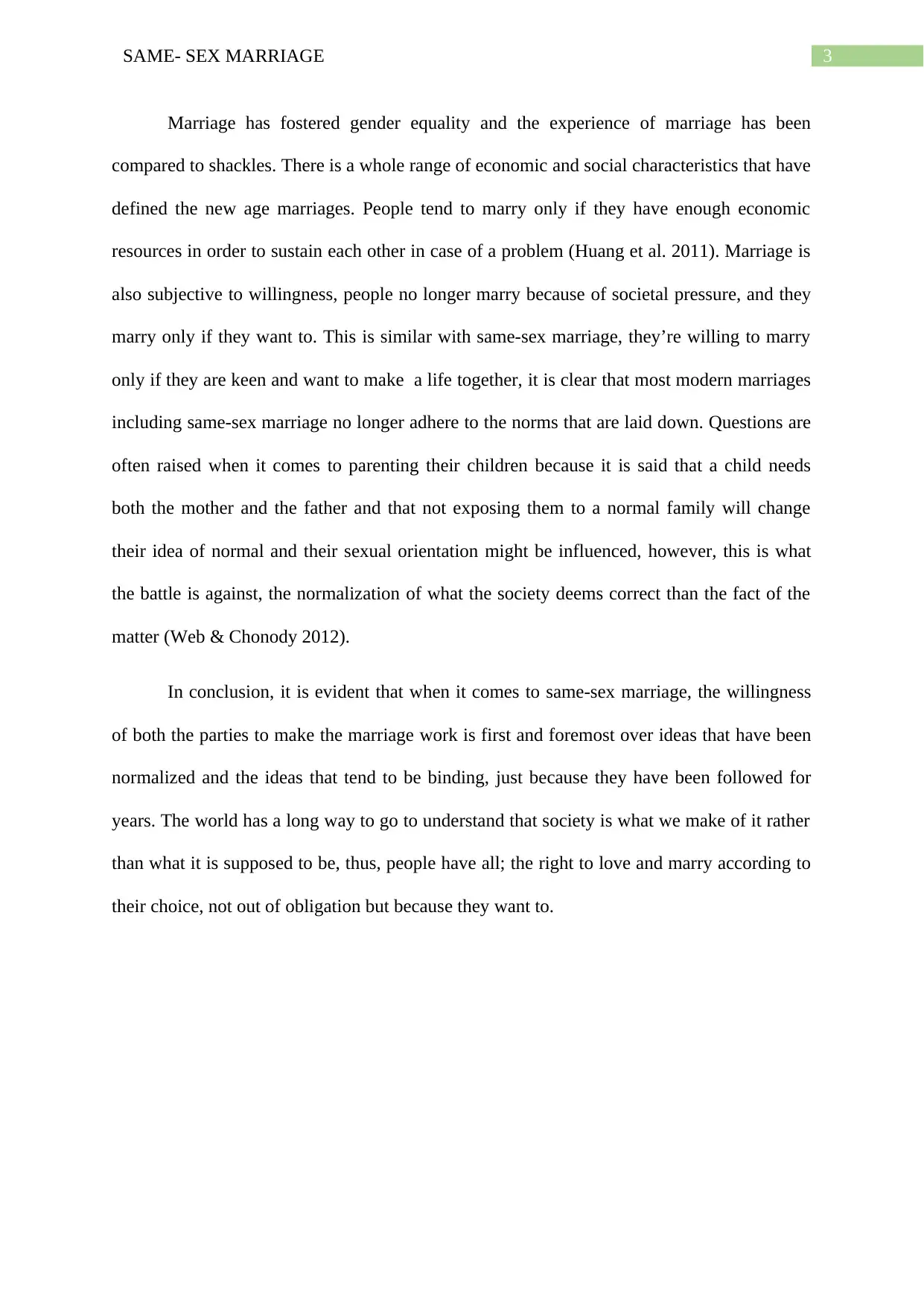
3SAME- SEX MARRIAGE
Marriage has fostered gender equality and the experience of marriage has been
compared to shackles. There is a whole range of economic and social characteristics that have
defined the new age marriages. People tend to marry only if they have enough economic
resources in order to sustain each other in case of a problem (Huang et al. 2011). Marriage is
also subjective to willingness, people no longer marry because of societal pressure, and they
marry only if they want to. This is similar with same-sex marriage, they’re willing to marry
only if they are keen and want to make a life together, it is clear that most modern marriages
including same-sex marriage no longer adhere to the norms that are laid down. Questions are
often raised when it comes to parenting their children because it is said that a child needs
both the mother and the father and that not exposing them to a normal family will change
their idea of normal and their sexual orientation might be influenced, however, this is what
the battle is against, the normalization of what the society deems correct than the fact of the
matter (Web & Chonody 2012).
In conclusion, it is evident that when it comes to same-sex marriage, the willingness
of both the parties to make the marriage work is first and foremost over ideas that have been
normalized and the ideas that tend to be binding, just because they have been followed for
years. The world has a long way to go to understand that society is what we make of it rather
than what it is supposed to be, thus, people have all; the right to love and marry according to
their choice, not out of obligation but because they want to.
Marriage has fostered gender equality and the experience of marriage has been
compared to shackles. There is a whole range of economic and social characteristics that have
defined the new age marriages. People tend to marry only if they have enough economic
resources in order to sustain each other in case of a problem (Huang et al. 2011). Marriage is
also subjective to willingness, people no longer marry because of societal pressure, and they
marry only if they want to. This is similar with same-sex marriage, they’re willing to marry
only if they are keen and want to make a life together, it is clear that most modern marriages
including same-sex marriage no longer adhere to the norms that are laid down. Questions are
often raised when it comes to parenting their children because it is said that a child needs
both the mother and the father and that not exposing them to a normal family will change
their idea of normal and their sexual orientation might be influenced, however, this is what
the battle is against, the normalization of what the society deems correct than the fact of the
matter (Web & Chonody 2012).
In conclusion, it is evident that when it comes to same-sex marriage, the willingness
of both the parties to make the marriage work is first and foremost over ideas that have been
normalized and the ideas that tend to be binding, just because they have been followed for
years. The world has a long way to go to understand that society is what we make of it rather
than what it is supposed to be, thus, people have all; the right to love and marry according to
their choice, not out of obligation but because they want to.
Paraphrase This Document
Need a fresh take? Get an instant paraphrase of this document with our AI Paraphraser
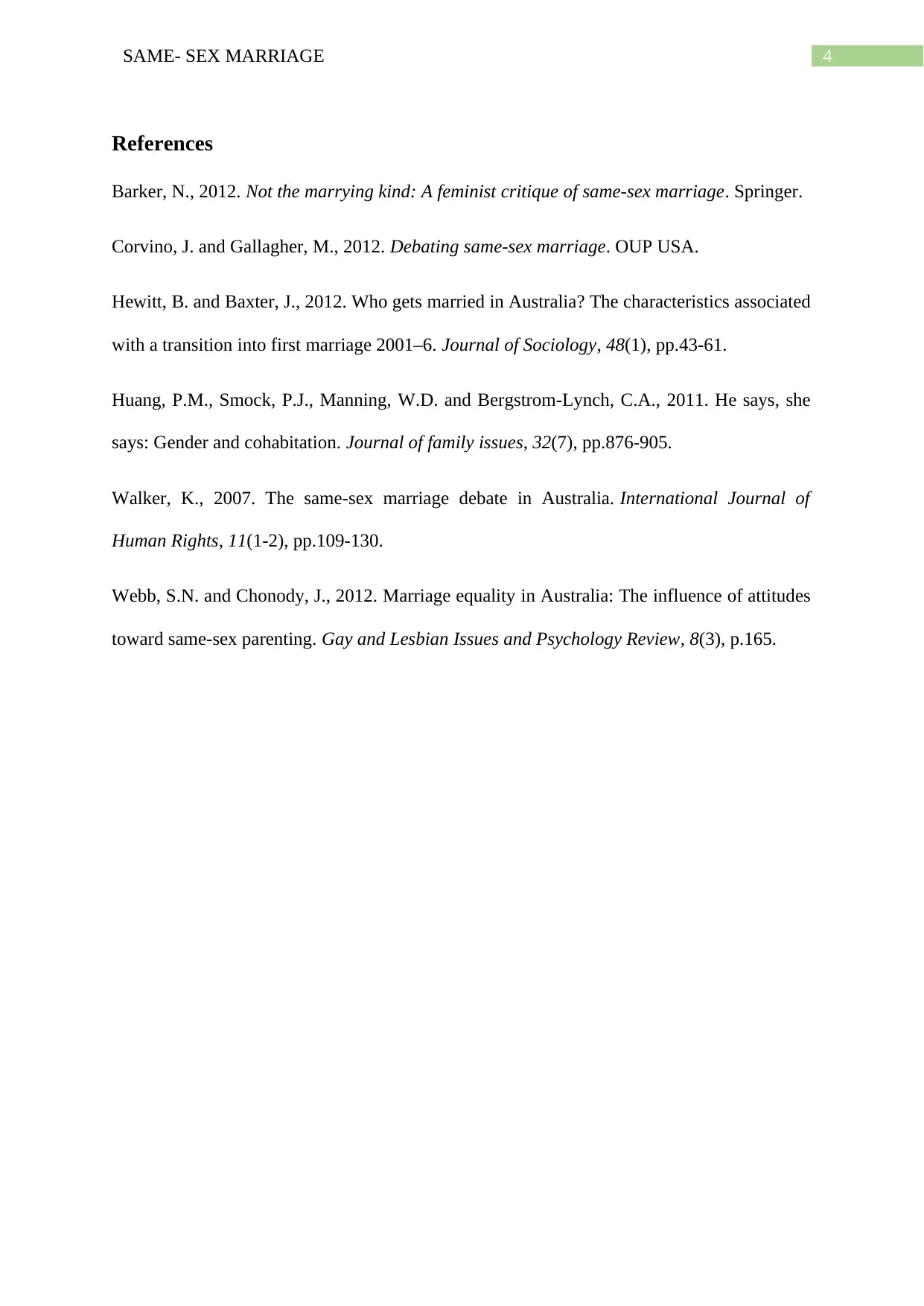
4SAME- SEX MARRIAGE
References
Barker, N., 2012. Not the marrying kind: A feminist critique of same-sex marriage. Springer.
Corvino, J. and Gallagher, M., 2012. Debating same-sex marriage. OUP USA.
Hewitt, B. and Baxter, J., 2012. Who gets married in Australia? The characteristics associated
with a transition into first marriage 2001–6. Journal of Sociology, 48(1), pp.43-61.
Huang, P.M., Smock, P.J., Manning, W.D. and Bergstrom-Lynch, C.A., 2011. He says, she
says: Gender and cohabitation. Journal of family issues, 32(7), pp.876-905.
Walker, K., 2007. The same-sex marriage debate in Australia. International Journal of
Human Rights, 11(1-2), pp.109-130.
Webb, S.N. and Chonody, J., 2012. Marriage equality in Australia: The influence of attitudes
toward same-sex parenting. Gay and Lesbian Issues and Psychology Review, 8(3), p.165.
References
Barker, N., 2012. Not the marrying kind: A feminist critique of same-sex marriage. Springer.
Corvino, J. and Gallagher, M., 2012. Debating same-sex marriage. OUP USA.
Hewitt, B. and Baxter, J., 2012. Who gets married in Australia? The characteristics associated
with a transition into first marriage 2001–6. Journal of Sociology, 48(1), pp.43-61.
Huang, P.M., Smock, P.J., Manning, W.D. and Bergstrom-Lynch, C.A., 2011. He says, she
says: Gender and cohabitation. Journal of family issues, 32(7), pp.876-905.
Walker, K., 2007. The same-sex marriage debate in Australia. International Journal of
Human Rights, 11(1-2), pp.109-130.
Webb, S.N. and Chonody, J., 2012. Marriage equality in Australia: The influence of attitudes
toward same-sex parenting. Gay and Lesbian Issues and Psychology Review, 8(3), p.165.
1 out of 5
Related Documents
Your All-in-One AI-Powered Toolkit for Academic Success.
+13062052269
info@desklib.com
Available 24*7 on WhatsApp / Email
![[object Object]](/_next/static/media/star-bottom.7253800d.svg)
Unlock your academic potential
Copyright © 2020–2026 A2Z Services. All Rights Reserved. Developed and managed by ZUCOL.





